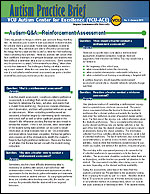
Information, resources and research about work and disability issues
Virginia Rehabilitation Association Award Winners

A. R. Dawson Humanitarian Award - Alissa Molinelli and Whitney Ham, both VCU-RRTC employees, won the A.R. Dawson Humanitarian Award. In 1971, Dr. Dawson, Director of geriatric and rehabilitation services for the Virginia Department of Mental Hygiene and Hospitals, initiated this award with a $1,000 grant and presented the first award. It is presented for outstanding services to people with disabilities by a practitioner, who is not in an administrative or supervisory position. Awarded to a professional person having direct contact with persons with disabilities in the rehabilitation process, and whose efforts have had a significant impact on their lives. Individuals may have worked in psychology, vocational evaluation, or medical specialties.
R.N. Anderson Award for Leadership - Jennifer McDonough, also an employee of VCU-RRTC won the R.N. Anderson Award for Leadership. In 1986 a classroom at Woodrow Wilson Rehabilitation Center was dedicated to the memory of Mr. Anderson, the first Commissioner of the Virginia Department of Rehabilitative Services. This award is given to a current member of the Virginia Rehabilitation Association who has demonstrated excellence in services to persons with disabilities. The first R.N. Anderson Award was presented in 1961.
VCU Autism Center for Excellence
Webcast
 Date: 11/8/2011, 3:30 pm Eastern
Date: 11/8/2011, 3:30 pm Eastern
Smartphones, iPads and Tablet PCs as Cognitive-Behavioral Aids in Autism by Dr. Tony Gentry
Dr. Gentry will present information on how Smartphones, PDAs, iPads, and tablet computers can be powerful tools for managing cognitive-behavioral challenges experienced by people with autism. He will share how these tools can be easily customized to support just-in-time activity cueing, task-sequencing, wayfinding, communication assistance, and behavioral coaching, among other uses. This presentation will examine consumer platforms, applications, and strategies for implementing individualized cognitive-behavioral suites, providing real life case studies, practical examples, and outcome measures to assure success.
Register for $25 per webcast or Register for the entire 4-webcast series for $75. Group rates available. * Note: This training is free to Virginia participants.
VCU-ACE Q&A Factsheet
 Using Prompts to Promote Skill Acquisition
Using Prompts to Promote Skill Acquisition
Prompts are used every day by friends, coworkers, parents, teachers, or anyone who is teaching or showing another person a new skill. For example, a supervisor explains to a new employee how to access documents on the office computer network. A sales person explains to a customer how to use a cell phone while demonstrating the phone's features. A teacher taps a student on the back and points in the direction of the coat closet to prompt him to hang up his coat. In these examples, verbal, model, gestural and/or physical prompts are being used to assist each person in performing a specific skill. How and when different prompts are used depends on the person's skill level, the activity to be completed and the amount of assistance needed for successful completion of the activity. Read the entire factsheet
Upcoming Online Courses
Foundations of ASD: National Autism Online Training Series (Nov 7 - Dec 5, 2011)
Autism Spectrum Disorders are considered to be a lifelong neurological developmental disability which share many characteristics. With the number of individuals diagnosed with autism on the rise, there is a strong probability everyone will encounter someone with ASD either at work or daily life. This course will provide participants with an understanding of the primary characteristics of ASD, which include impairments in communication and social development and the presence of repetitive patterns of behavior. Secondary characteristics, including sensory processing differences and motor deficits will also be explored. The course will discuss the impact ASD has on the person as well as the family unit. The course will also provide an overview of learning styles, the history, cause, and early signs of ASD. Cost: $125 per individual | $500 for 5 individuals Register Online
VCU-ACE is funded by the VA DOE (Grant # 881-61172-H027A100107). For additional information, contact autismcenter@vcu.edu or (855) 711-6987. If you live in Virginia, please contact VCU-ACE for a schedule of courses offered at no cost through funding from the VA DOE.
Supported Employment for Individuals with Traumatic Brain Injury (Nov 7 - Dec 5, 2011)
Early demonstration projects back in the late 1980's and 90's paved the way for using a supported employment approach for someone who has sustained traumatic brain injury (TBI). This course will offer participants an overview of TBI and the supported employment literature suggestions on specific strategies to use to get to know the job seeker, look at possible workplace supports with an emphasis on compensatory memory strategies and some insight into ways to provide pro-active job retention services. Register Online
Upcoming 2012 Online Courses. Register before the Holidays!
Supported Employment Web-based Certificate Series (Jan. 30 - Apr 23, 2012) - ACRE-certified* -
This online course provides an extensive overview of supported employment and how to facilitate competitive jobs for individuals with significant disabilities. Topics include: Federal Policy and Overview Customer Profile; Marketing and Job Development; Job-Site Support; and Long Term Supports & Funding. Find out more & Register
Supported Competitive Employment for Individuals with Mental Illness (Jan 30 - Apr 23, 2012) - ACRE-certified* -
This online course provides an extensive overview of supported competitive employment for individuals with mental illness. Sessions will include these topics: Overview and Values Base; Building Relationships with Business; Establishing a Career Direction; Locating Work Opportunities; Employment Support; and Funding & Other Topics. Find out more & Register
Individualized Placement and Support (IPS) Supported Employment Practice Principles Expand
The latest principle involves building relationships with employers. Employment specialists ask to meet with employers who may have the types of jobs that their clients prefer, whether or not those businesses currently have job openings. They are encouraged to spend time every week meeting with employers to learn about their businesses and understand their hiring practices. Employment specialists view each employer as a customer whom she can help by introducing job applicants who have the right skills and strengths for that particular business.
The eight IPS Supported Employment Practice Principles are:
- Every individual who wants to work is eligible.
- IPS supported employment services are integrated with mental health treatment.
- Competitive jobs are the goal.
- Personalized benefits counseling is offered to all program participants.
- The job search begins soon after a person expresses interest in working.
- Employment specialists systematically develop relationships with employers based upon their client's job preferences.
- Job supports are continuous.
- Individual preferences are honored.
Reprinted with permission, Employment Works Summer, 2011, Dartmouth College, Dartmouth Psychiatric Research Center